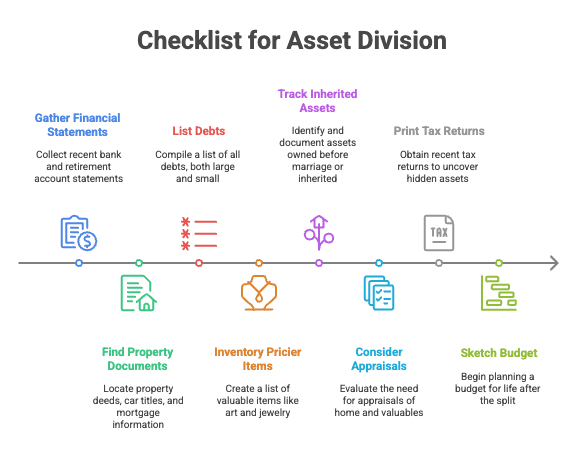- What Does "Equitable Distribution" Really Mean?
- Marital Property vs. Separate Property: It's Not All Up for Grabs
- How Do You Figure Out What Everything's Worth?
- The Asset Division Process (In Real Life)
- Checklist: Before You Start Dividing Assets
- Frequently Asked Questions (Because You're Not the Only One Wondering)
- A (Quick) Story-Because We All Relate to Real Life
- Resources for When You Want to Dig Deeper
- You've Got This
Let’s be honest: dividing stuff during a divorce isn’t exactly something most of us ever prepare for. No one walks down the aisle dreaming of the day they’ll have to figure out who gets the house plants, let alone the retirement accounts. But here you are, maybe feeling overwhelmed, maybe just curious, or maybe somewhere in between (hey, I get it). The good news? In Colorado, there’s a process for this—one that aims to be fair, even if it isn’t always 50/50. Let’s break it down together.
At Jones Law Firm, managing attorney April D. Jones brings over 30 years of expertise in Colorado family law. Having successfully guided clients through thousands of divorces involving complex asset divisions, we understand the nuances—and we’re here to make it simpler.
What Does “Equitable Distribution” Really Mean?

So, you’ve probably heard the term “equitable distribution” tossed around, especially if you’ve Googled phrases like “Colorado divorce asset division” or “How do we divide stuff if we split up?” Here’s the thing: equitable doesn’t always mean equal.
In Colorado, the law wants things to be fair. But fair doesn’t always mean splitting EVERYTHING straight down the middle. Instead, the courts look at each family’s situation. Maybe you owned your house before marriage, or maybe your spouse got a big inheritance. The judge wants to know what makes sense for your actual lives, not just what’s written on a balance sheet.
Marital Property vs. Separate Property: It’s Not All Up for Grabs
Let’s tackle a big question:
Does everything we have get split?
Short answer: It depends.
In Colorado, there are two main buckets:
- Marital Property: Stuff you and your spouse got during your marriage. Think of paychecks, the house you bought together, joint savings accounts, or even that painting you picked up on vacation.
- Separate Property: Stuff that belongs to just one of you. This generally means anything you owned before you tied the knot, gifts given specifically to you, or inheritances you received (as long as you kept them separate).
But here’s where people get tripped up: sometimes, these buckets mix. Maybe you used your inheritance to redo the kitchen. Or your premarital savings went into a new, joint house. When that happens, things get murky, and the courts might call for “tracing” to figure out what’s what. It’s normal to feel a bit frazzled by this; you’re not alone.
Real-life example:
Imagine you inherited $50,000 before your marriage but used it to buy a house together. Now, if you split, the court might consider that house—at least partly—marital property. It’s not always black and white.
How Do You Figure Out What Everything’s Worth?
Ah, the great valuation adventure! (Said no one ever… but bear with me.) Valuing assets can get surprisingly complex, but here are the basics:
- Real estate: Usually, a professional appraiser steps in to figure out the value.
- Investments & retirement accounts: These can require statements, but sometimes you’ll want a financial expert for trickier stuff like stock options. Retirement accounts specifically might need a Qualified Domestic Relations Order (QDRO) to split them legally.
- Personal property: Cars, jewelry, art—all can have their own appraisers if needed.
- Debts: Yep, you can’t forget about the mortgage, credit cards, or car loans. These get divvied up as well.
Colorado law (C.R.S. §14-10-113) provides detailed guidelines on asset valuation and division. Understanding these guidelines can significantly reduce confusion and disputes.
Don’t have a stack of paperwork lying around? Totally normal. Start with recent statements and work your way backward—organization here can seriously bring down stress levels.
The Asset Division Process (In Real Life)

So how does it typically play out in a Denver divorce? Here’s a peek behind the curtain:
- List everything. You can’t divide what you don’t know exists. This means all assets and debts.
- Label marital vs. separate property. Sometimes this is obvious; other times, it takes some detective work.
- Give everything a value. See that section above for tips.
- Negotiate, mediate, or (if need be) litigate. A lot of people sort things out through negotiation or mediation. Court usually steps in only if you can’t agree.
Common things to split up:
- Family homes, rental properties, land the in-laws gave you
- Cars, boats, that random RV you barely used
- Retirement plans (401k, IRAs, pensions)
- Personal loans, joint credit card debt
One thing I always remind people: It’s okay to have mixed feelings about all this. It’s personal and can feel strange—but you’re really just working through practical steps for a better future.
April and her team made my divorce quick and smooth. I would recommend them to any one. Even after my case if I need to call in for anything the team there are always so nice and helpful. I would not be in the life I have now if it weren’t for the help I got from this firm.
S.R. Denver Client
Checklist: Before You Start Dividing Assets
Sometimes it helps to see it all laid out, right? Here’s a quick checklist to keep you on track:
- [ ] Gather recent statements for bank/retirement accounts
- [ ] Find property deeds, car titles, and mortgage info
- [ ] List all debts, large and small
- [ ] Make a list of “pricier stuff” (art, jewelry, collectibles)
- [ ] Track anything you inherited or owned before marriage
- [ ] Consider getting your home/appraised valuables appraised
- [ ] Print out recent tax returns (they help uncover hidden stuff)
- [ ] Start sketching out your budget for life after the split
Even if you miss a step, don’t sweat it. Do your best—you can fill in the blanks as you go.

Frequently Asked Questions (Because You’re Not the Only One Wondering)
Nope! “Equitable” means fair, not necessarily equal. Sometimes a judge will split things differently based on each spouse’s circumstances.
If the loan was taken out before marriage, it’s probably separate. If you took out a loan during the marriage, it could be marital—and divided up.
Strange but true—in Colorado, pets are considered property. Courts sometimes look at who cares for the pet, but there usually aren’t formal custody arrangements like for kids.
They can try, but it’s risky—and the courts frown on it. Full disclosure is required, and hiding stuff can create big legal headaches.
Not always! Many couples work things out through negotiation or mediation. The court only steps in if you can’t agree.
A (Quick) Story—Because We All Relate to Real Life
We once spoke to someone who was terrified she’d lose her grandmother’s engagement ring, which she inherited before the marriage. She’d heard from friends that “the court takes everything.” Turns out, sentimental things you clearly owned before marrying usually stay with you. Her story isn’t unique; it’s completely normal to worry about what matters most to you.
Resources for When You Want to Dig Deeper
- Colorado Judicial Branch: Divorce & Property Division Help
- Colorado Revised Statutes §14-10-113: Division of Property
- More info and FAQs on property division
You’ve Got This
Look, no one enjoys dividing up assets when a marriage ends—but knowing the process, and what “equitable distribution” means in Colorado, can make things less overwhelming. Keep your paperwork organized, don’t be afraid to ask questions, and remember: Most people face the same worries and challenges. You’re not alone, and you’re not the first to walk this path.
If things feel overwhelming or you have a mountain of complex stuff to sort out, reaching out to a family law pro or financial advisor isn’t admitting defeat—it’s just being smart about your future. And who doesn’t want a smoother road ahead?
Got more questions? Don’t be shy—curiosity is a sign you care about doing this right. Good luck, and take care of yourself.
This article is for informational purposes. For personalized advice specific to your situation, connect with a trusted Denver divorce attorney.
